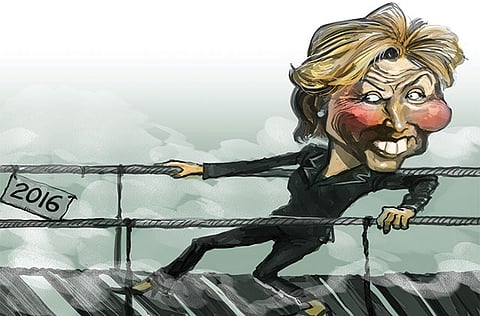Hillary’s rickety bridge to White House
In politics, winning is ultimately about ideas

The grand view of American politics is that Republicans have a lock on Congress, while Democrats have an inbuilt White House advantage. Last month’s Republican victory shored up that theory. Conservatives reliably turned out for the mid-term elections, while liberals hibernated. Come the glamour of 2016, Hispanic, millennial, single female and African American voters will be back in force. All that Hillary Clinton need do — or whoever takes the Democratic nomination — is tick the right boxes and let demography fix the rest.
Such is the US Left’s world view. It is also a measure of its intellectual poverty. Whatever liberals are smoking, it is no stimulant to new ideas. The Left’s sense of destiny is based on America’s shift to a minority-majority nation within the next 30 years. As the white vote shrinks, each presidential race will be harder for Republicans to win. What is missing is a compelling reason for people to embrace Democrats, as opposed to rejecting Republicans. For the time being, the latter can be relied upon to offend minorities — notably Hispanics. But Democrats have remarkably little new to say about the future of America’s middle classes, regardless of ethnicity.
Without a credible economic plan, the US left risks being little more than a rainbow coalition. This is the danger facing Hillary’s candidacy. It is possible — perhaps even likely — that Republicans will select a nominee who has alienated so many Americans that he will be unable to compete in a general election. It is also plausible that Hillary will appeal to enough women, Hispanics and others to ensure her electoral maths are prohibitive. That is the working theory. Unless Hillary can find a positive story to engage America’s middle classes it is the only one that is likely to work in practice.
The signs, so far, are misleadingly optimistic. Most of the Left’s energy comes from its social victories. In the past decade, the US has flipped from being a relatively intolerant country for gays — at least compared with northern Europe and Canada — to being one of the most progressive in the world.
One of the silver linings in the left’s sweeping defeat last month was the approval in three ballot initiatives — Alaska, Oregon and the District of Columbia — of recreational marijuana. Colorado and Washington State had already led the way. Several more states, including California, Maine and Arizona, are drafting similar choices for 2016. For the first time ever, a majority of Americans support legalising pot, according to Pew Research. It is a far cry from the hippie-disdaining days of Ronald Reagan. But this is more of a stoner’s manifesto than an electoral trend.
Hillary’s network of donors are comfortable with social liberalism. The bulk of her money will come from places like Wall Street and Silicon Valley, which are either neutral or supportive on social issues. Their focus is on lower taxes and fewer regulations. Hillary’s challenge will be to square her donors’ priorities with America’s increasingly apolitical young voter. A large slice of millenials likes to spliff up. Many are gay and non-white. But that does not automatically make them Democrats. Those who are unemployed want jobs. Those who have jobs want a pay rise. All that most will remember is eight lean years under President Barack Obama.
Hillary faces two problems in igniting their passion. First, Obama has lost the faith of the liberal base. Much of what remains has been captured by Elizabeth Warren, the senator from Massachusetts, who insists she has no intention of taking on Hillary. Warren’s message is anti-Wall Street. It resonates with the party’s grass roots — and probably most of its grass consumers too. Her populism puts Hillary in a bind. She would have a hard time co-opting Warren’s language without alienating her financial backers. Yet, she must also find a new generation of economic advisers.
At a time of crisis, Obama turned to the gurus of Hillary’s husband’s presidency — the so-called Rubinites, after Robert Rubin, Bill Clinton’s longest-serving treasury secretary. Hillary will need new ideas and new faces. Who they will be — and what they will advise — is anyone’s guess.
Second, Hillary runs up against the truism that the Democratic whole is often less than the sum of its parts. Republicans may be getting more monochrome — whites are a shrinking share of the US population and a growing part of the Republican one. But that makes them easier to marshal. It is simpler to target a message to one group than many. Obama overcame that problem in 2008 with a once-in-a-generation appeal to a larger sense of America. It will be hard to conjure that vision again.
As it stands, whatever coalition is expected to carry Hillary over the finishing line is likely to result from a calculated process of addition. In politics, winning is ultimately about ideas. In the absence of new ones, Hillary’s bridge to the White House looks rickety.
— Financial Times



